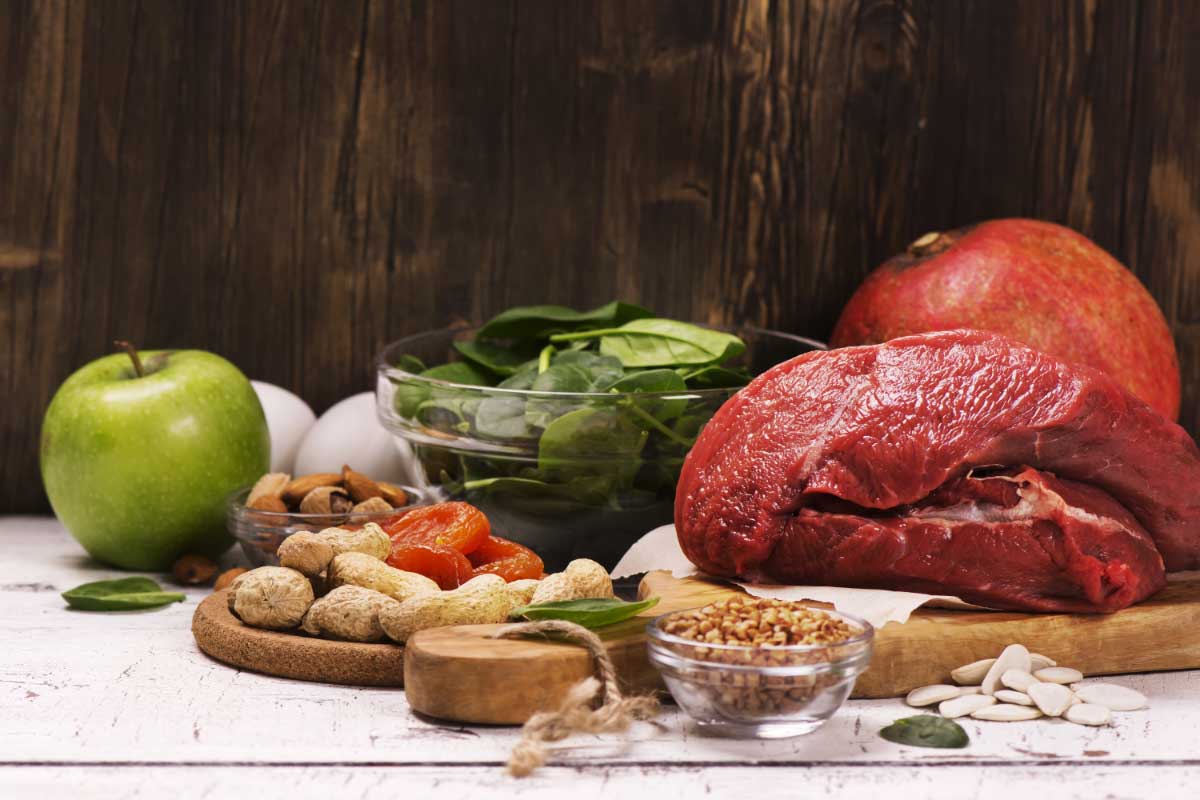Iron is a common mineral that helps reduce fatigue, depression and help restore balance to the blood stream. You can find iron naturally in many different foods such as red meat, poultry, fish, lentils, chickpeas, and often you will find that breakfast cereals are fortified with iron.
Supplements are often made from either Iron (II) fumarate or Iron (II) sulfate. Both are excellent supplement ingredients and are easily absorbed by the body (1).
Best Iron
1. Solgar Gentle Iron
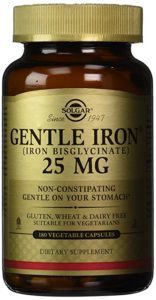
Solgar Gentle Iron is our number best iron supplement that comes in the form of Iron Bisglycinate. Iron Bisglycinate produces fewer side effects than most other forms of iron (hence the name Gentle Iron). While some alternative forms of Iron have caused various side effects and have even been linked to biomarkers, this form of Iron is the most bioavailable form of Iron you can find.
Solgar Gentle Iron contains no preservatives or fillers, as well as no sugar, salt, starch, corn, yeast, wheat, soy, or dairy products.
2. Ferretts Iron Supplement
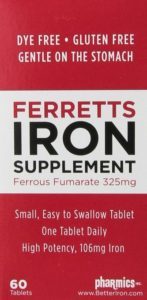
Ferretts Iron Supplement is a supplement that provides 589% of your daily value of Iron and provides the body with ferrous fumarate, which is used for iron deficiency. These tablets are used as a dietary supplement for better tolerance and absorption in the body. Each tablet is 106mg and are very small tablets for easy digestion.
It is dye-free, gluten-free, gentle on the stomach, and is highly potent.
3. Proferrin ES
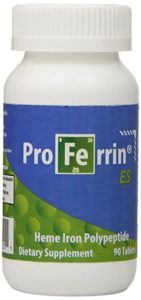
Proferrin ES is an oral iron supplement made by Colorado Bio Labs, Inc. Proferrin ES iron tablets supply 10.5mg of iron as heme iron polypeptide with each serving. Heme is a natural form of iron that derives directly from animal sources.
Because this form of iron is all natural and derived from animal sources, it is highly potent and bioavailable, making your body able to absorb this easier than other supplements.
4. Feosol Ferrous Sulfate Iron
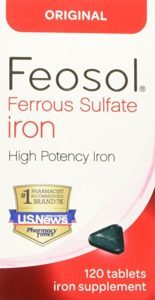
Feosol Ferrous Sulfate Iron is a high potency iron supplement that uses ferrous sulfate. Ferrous sulfate is a time-tested form of iron that provides 360 percent of the recommended daily value of iron.
Each tablet contains 65mg of elemental iron, which is equivalent to 325mg of ferrous sulfate. This makes this sulfate iron supplement highly potent and easy to absorb by the body.
5. Natures Bounty Iron
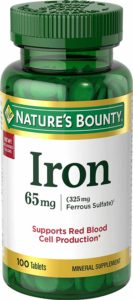
Natures Bounty Iron is an iron supplement in pill form that provides 65mg of elemental iron per tablet, which is the equivalent to 325mg of ferrous sulfate.
This is a vegetarian-friendly tablet that contains dried ferrous sulfate and is a mineral supplement that was made by an innovative brand that cares about the quality of its supplements.
6. Vitamin Code Iron Complex
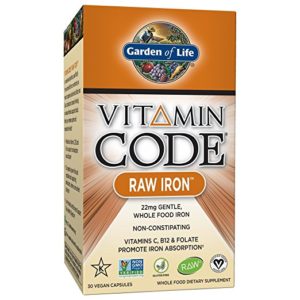
Garden of Life’s Vitamin Code iron complex is a raw iron whole food vitamin supplement. This iron supplement also contains whole food vitamins C, B12, and folate to help support iron absorption and utilization.
It’s made from 23 raw fruits and vegetables and is raw, vegan, gluten-free, and dairy-free with no binders and no fillers.
7. Solimo Iron
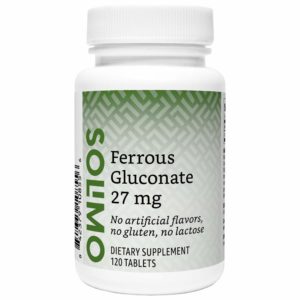
Solimo Iron is an iron supplement in the form of ferrous gluconate. There is 27mg of this substance in each tablet, and this contains no artificial flavors, no gluten, and no lactose.
These supplemental tablets were created to help with any form of iron deficiency, are easily swallowed, and have much fewer side effects than other iron supplements.
8. Slow Fe Iron Supplement
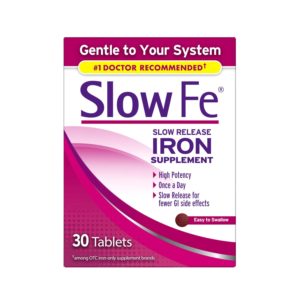
Slow Fe Iron Supplement is an iron supplement in the form of tablets and is the #1 doctor recommended iron supplement among all over the counter iron-only supplement brands.
This is easy to swallow and is high potency and causes fewer side effects because of a controlled release system that delivers iron slowly to your body.
9. Nature Made Iron Tablets
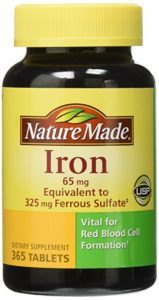
Nature Made Iron is an iron supplement that contains 65mg tablets, which is from ferrous sulfate.
There are no synthetic dyes, no artificial flavors, no artificial sweeteners, no gluten, and was made from carefully selected ingredients.
10. Vitron-C High Potency Iron
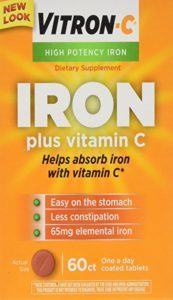
Vitron-C High Potency Iron is an iron supplement that also contains vitamin C for better iron absorption in the blood. This is the one of the only iron supplement brands that contains carbonyl iron, which provides gradual and gentle iron absorption, thereby minimizing side effects.
The vitamin C that is included in this iron supplement also gives less constipation than other forms of iron.
How We Rank
The first thing we looked for in our rankings for the best iron supplements was purity. Because there are many iron supplements that contain a variety of other ingredients, our top picks included supplements that did not contain any fillers or additional ingredients. Being free of artificial coloring and preservatives is very important. For example, we chose not to select the Celebrate Nutritional Supplements brand of iron because it contained twice as much Vitamin C. Also, it only lists that it is gluten-free, and contains other unnatural ingredients that made us not include it in the list.
The next thing we looked at was the dosage strength of the supplement. Some supplements contain so little amount of iron that you would have to take multiple pills each day or at once to get the same that you could get from one supplement at a time. The ease of taking pills only once or twice during a day is helpful and much better than having to take many pills throughout the day or many at once for the same dosage. For example, we didn’t include the EZ Melts Iron as elemental iron, because this supplement would be required to be taken at least 3 times a day, and more if you are highly deficient in iron. So, we didn’t add this supplement to our list.
Another thing we paid attention to was the bottle size and number of servings each month you get from iron. It is crucial to customers that they don’t have to continuously purchase additional bottles frequently. The EZ Melts Iion supplement, as well as many other supplements, don’t have bottles that have more pills in them, and many times you will run out of the pills within the first month of taking them.
The final reason for why we chose certain supplements over others was the form of iron that each supplement was supplied with. Our number one pick, Gentle Iron, contains the form of iron called “Iron Bisglycinate,” which is the best form of iron because it has the fewest side effects and can be absorbed the easiest.
Benefits
1. Iron supplementation may help reduce fatigue symptoms. While there aren’t many benefits to iron supplementation in people who are not anemic (suffering from an iron deficiency) there does appear to be some evidence that iron supplementation can reduce fatigue.
A 2003 study in the British Medical Journal found that non-anemic women who suffered from unexplained fatigue found an improvement in symptoms after taking iron (2) .
The study found that a lot of the women who saw an improvement had low levels of ferritin (an intracellular protein that stores and releases iron in the body).
A similar study in 2012 by Vaucher et al also found that women who had low ferritin levels and unexplained fatigue may benefit from iron supplementation, the study indicated that six weeks of supplementation were sufficient to see an improvement (3).
While the women were not anemic, having low levels of ferritin is a common cause of iron deficiency anemia (4).
2. Iron supplementation may also reduce the risk of depression. A 2017 meta analysis in the journal of Psychiatry Research looked at dietary zinc and iron intake and its effect on the risk of depression. The meta analysis found that there was a link and that taking iron supplements (as well as zinc) may help reduce depression risk (5).
A similar study in 2007 in the European Journal of Clincal Nutrition found that there was a relationship between depression and serum ferritin levels. As with fatigue, it would appear that taking iron supplements would help to reduce depression risk (6) .
If ferritin levels of low, it would take a larger dose of iron to meet dietary requirements – making it more difficult to get enough iron through diet alone.
3. Iron supplementation may help prevent hair loss. One of the side effects of iron deficiency anaemia is hair loss (7).
If this is the case then supplementation with iron can prevent it. Sadly there are many causes of hair loss, and iron supplementation cannot treat any of them except for the iron deficiency induced version.
A study in the British Journal of Dermatology found that there was no association with low serum ferritin and chronic diffuse telogen hair loss (8).
This means that regular hair loss is unaffected. However, if your hair loss is due to iron deficiency anemia then taking an iron supplement could help treat it.
A study in the Journal of the American Academy of Dermatology (2006) states that while giving iron supplements to people with hair loss is not a good idea, screening people who are experiencing hair loss for an iron deficiency could be helpful (9).
4. Iron supplementation may improve cognition in women/children who are iron deficient. A study in The Lancet (1996) by Bruner et al looked at the impact of iron supplementation in young girls who are iron deficient (10).
The study screened 716 adolescent girls for non-anemic iron deficiency, out of those 716 girls 81 were found to have non-anemic iron deficiency. Participants were either offered 650mg of Iron Sulphate twice per day, or a placebo.
Next, the girls performed four tests that measured attention and memory. The girls who received Iron Sulphate performed better in both verbal learning and memory compared to the placebo group. A 2014 study in Neuropsychiatric Disease & Treatment re-examined the subject (11).
The study noted that “despite there being methodological differences among studies, there is some evidence that iron supplementation improves cognitive functions. Nethertheless, this must be confirmed by means of adequate follow-up studies among different groups”.
A 2004 study in Nutrition Reviews stated that “Undernutrition and deficiencies of iodine, iron, and folate are all important for the development of the brain and emergent cognitive functions” (12).
In other words, children should avoid deficiencies in iron while growing if they want optimal cognitive function as they age.
A study in Public Health Nutrition (2005) by Sachdev, Gera, and Nestel looked at the effect of iron supplementation on mental and motor development in children (13).
It found that iron supplementation has a modest effect on mental development scores. “This effect is particularly apparent for intelligence tests above 7 years of age and in initially anemic or iron-deficient anemic subjects”.
5. Iron supplementation can reduce the risk of anemia in menstruating women. The most common use for iron supplementation is to reduce the risk of anemia in women who are menstruating. Teen girls and women with heavy periods are the most in need of iron supplementation (14).
A study on Danish women aged 18 to 30 found that moderate daily doses of iron supplementation could help prevent iron deficiency (15).
It stated that “preventative measures should be focused on those women whose menstruation lasts 5 days or longer, who have menstrual bleeding of strong intensity, who use IUD without gestagen, and who are blood donors”. (IUD stands for intrauterine devices).
Another study by Simon, Hunt, & Garry (1984) found that iron supplementation was beneficial to menstruating women who donated blood (16).
This was because iron supplementation helped maintain body iron stores and hemoglobin levels.
In a study looking at male and female blood donors in the Journal of the American Medical Association (JAMA) in 1981 “reduced iron stores were found in 8% of male and 23% of female donors. Menstruation significantly lowered iron stores in women” (17).
6. Iron supplementation may help improve behavioral development in children. A study in 2000 by Grantham-McGreggor, Walker, & Chang looked at the effects of nutritional deficiencies in behavior (18).
They stated that “There is substantial evidence that reduced breast-feeding, small-for-gestational-age birth weight, Fe and I deficiency, and protein-energy malnutrition (PEM) are associated with long-term deficits in cognition and school achievement”.
Fe is the chemical name for Iron, and as stated a deficiency in iron may cause issues with behavior and cognition. There is not enough evidence that iron supplementation can improve behavioral development in children.
A 2008 study in the British Journal of Nutrition concluded that prenatal iron supplementation had no effect on child behavior at an early age (19).
But this study was looking at women taking iron while pregnant, rather than supplementing the diet of children at risk of being iron deficient.
7. Iron supplementation may reduce risk of infection in children who are anemic. The jury is still out with regards to the effect of iron supplementation on infection risk. It is known that having an iron deficiency can lead to a reduced ability to fight infection, but studies have failed to definitively say whether iron supplements can remedy this.
An article by Stephen Oppenheimer in The Journal of Nutrition (2001) gave an overview on current scientific thinking on the subject (20).
He mentioned two studies in particular that could point to iron having a positive effect on infection risk.
“Milk fortification reduced morbidity due to respiratory disease in two early studies in non malarious regions” and “one study in a non malarious area of Indonesia showed reduced infectious outcome after oral iron supplementation in anemic schoolchildren”.
He also mentioned studies that did not find similar results, deciding that more research was needed before reaching a conclusion.
8. Iron supplementation may reduce the risk and cause of restless leg syndrome (RLS). A study from the RLS Foundation published a study that showed that iron deficiency conditions are a major environmental trigger for RLS.
RLS is associated with altered homeostasis involving brand, vasculature, and lymphocytes. There is a disconnect between serum-determined levels of iron and brain cellular iron levels in many RLS patients. Those who develop restless leg syndrome, or even simply find that they have restless legs while sitting or lying in bed, could have an iron deficiency. An increase in iron via supplementation of highly-absorbable forms of iron could help reduce or even solve the problem of RLS in adults.
The most consistent finding has been cellular iron insufficiency in the substantia nigra, which means Iron supplementation can help reduce the effect of RLS (21).
Side Effects
1. Iron Supplementation may increase the risk of developing diarrhea. A study in the British Medical Journal (2002) looked at 28 controlled trials on 7892 children (22).
The study was designed to find out whether iron supplementation could increase the incidence of infectious illnesses in children. It found that iron had no effect on infectious illnesses, but did slightly increase the risk of developing diarrhea.
But other studies have found contradictory results. A 2003 study in the Journal of Nutrition found that while a micronutrient mix supplement (containing iron) increased incidence of diarrhea in Bangladeshi children, a zinc and iron supplement significantly reduced incidence of diarrhea (23).
According to the National Institute of Health “acute intakes of more than 20mg/kg of iron from supplements or medicines can lead to gastric upset, constipation, nausea, abdominal pain, vomiting” it recommends taking food at the same time as taking any iron supplement as it can reduce the likelihood of these symptoms (24).
It also possibly explains why diarrhea incidence may increase with iron supplementation.
2. Taking too much Iron through supplements can reduce zinc absorption. One of the potential causes of gastrointestinal upset is the fact that consuming too much iron can reduce zinc absorption and lead to a zinc deficiency.
A 1998 study in the American Journal of Clinical Nutrition looked at the interaction of iron and zinc in humans (25).
It found that although fortified foods were fine, iron supplements could lead to a reduction in zinc absorption.
Being deficient in zinc through poor absorption can lead to a number of issues.
One of the most common signs is diarrhea, but it can also affect cognition, cause skin issues (acne, eczema, xerosis), and may lead to a reduction in appetite (just to name a few issues) (26, 27) .
Taking a zinc and iron supplement together can prevent this issue, and also sticking to a guideline amount of iron each day will also help.
3. Overconsumption of iron can lead to iron poisoning (in extreme cases). Usually iron poisoning is caused by a genetic disorder or from repeated blood transfusions. However, it is also possible to get iron poisoning from overconsumption of iron through supplements and medication. Studies have found that severe overdoses of iron can lead to multi-system organ failure.
According to a 2004 study in Clinical Toxicology “From 1983 to 1991, iron caused over 30% of the deaths from accidental ingestion of drug products by children” (28).
As you can see, high doses of iron can not only lead to iron poisoning, it can lead to death – particularly in children (who are more likely to overdose) according to a 2011 study in Pediatric Emergency Care (29).
4. High iron supplementation may be associated with colorectal carcinoma when colitis is present. A medical study looked at two groups of mice of 16 each for a long-term carcinogenesis experiment (30).
It was found that a twofold iron-enriched diet significantly increased colorectal tumor incidence. 88% of this group of mice developed tumors as compared with 19% from the mice that were fed the control diet.
The iron-enriched diet was on dextran sulfate sodium-induced acute and chronic colitis in mice. What they discovered was after inducing colitis in the mice, having a twofold iron-enriched diet increased the development of colorectal carcinoma or cancer. This could provide insight into colitis patients and iron overdosing.
You should always be careful when taking supplements, and this shows the possibility of developing health problems if those who have colitis take too much iron supplementation.
Recommended Dosage
According to the NHS guidelines the recommended dosage of iron for men over 18 years of age is 8.7mg per day (31).
Women between 19 and 50 years should take 14.8mg per day (due to the increased need for iron that menstruation causes). Women over 50 should take 8.7mg per day, the same as men.
Women who are between 19 and 50 years old are the only group who should consider taking iron supplements. Particularly if they lose a lot of blood during their monthly period. Pregnant women should also ensure that they increase their iron intake as they need to produce more blood for the baby (supplementation can lead to larger birth weights (32)).
In the US the recommendation is for pregnant women to take 27mg of iron per day, roughly double the amount that a 19 to 50 year old woman is supposed to take each day (33).
In the UK the guidance is to stick to the 14.8mg per day intake. The average for pregnant women in the UK is around 10mg, so clearly more awareness of the importance of iron is needed.
Upper limits of iron per day differ depending on what age you are. According to the National Institutes of Health the upper limit for babies and children up to 13 years old is 40mg per day (34).
The upper limits for adults is 45mg per day. Any higher than that can lead to iron poisoning.
If you are suffering from iron deficiency then a doctor may prescribe you a higher dosage than that, which is obviously okay as you are deficient. But always consult with your doctor rather than experimenting yourself.
FAQ
What foods are rich in iron? These foods include liver, meat, fish, tofu, eggs, nuts, beans and dried fruit.
What does iron do in the body? Iron helps create red blood cells – which help carry oxygen around the body.
How can I boost my iron levels quickly? You can eat lean red meat. You can also take iron pills, or if need be get an IV with iron straight into the blood stream.
What blocks the absorption of iron? Calcium is the only known substance to inhibit absorption of both non-heme and heme iron.
What happens when you have a lack of iron? If you do not have enough iron, your body makes fewer and smaller red blood cells . Then your body has less hemoglobin, and you cannot get enough oxygen. Iron deficiency is the most common cause of anemia.
Which type of iron is best absorbed in the body? Heme iron is the most efficiently absorbed form of iron. The absorption rate of non-heme iron supplements, such as ferrous sulfate and ferrous fumarate, is 2.9% on an empty stomach and 0.9% with food. This is much less than the absorption rate of heme iron, as found in liver, which is as high as 35%.
Can you reverse an iron deficiency? Yes, as long as you address the root issue causing you to lose so much blood an iron. After that it’s simply a matter of eat iron rich foods.
Can you die from anemia? When you’re anemic your heart must pump more blood to compensate for the lack of oxygen in the blood. This can lead to an enlarged heart or heart failure.
Does too much iron cause colon cancer? Two alternative forms of Iron, Ferric Citrate and Ferric EDTA, were found to have been correlated with the formation of a biomarker associated with the development of colon cancer. There is no association with this biomarker in other forms of Iron.
Are there health risks that come from having too much iron? While most people searching for iron supplementation are having issues with having not enough iron, there are indeed health risks that come from excessive iron intake. Some of the primary health risks include gastric upset, constipation, nausea, abdominal pain, vomiting, and faintness.
What are the risks of taking Elemental Iron as a supplement? Taking supplements containing 25mg elemental iron or more can reduce zinc absorption in the body. For those who are deficient in zinc, this can cause the common zinc deficiency effects, including acne, eczema, xerosis, immune problems, diarrhea, and psychological disorders.
Can I overdose on iron? In severe cases, overdoses of iron can occur. Overdoses of iron can lead to multisystem organ failure, coma, convulsions, and even death. It is imperative to understand how much Iron you are taking in your supplements and to make sure you do not overdose on any supplement.
Where do iron deficiency deaths occur? Certain parts of Central Africa are common for iron deficiency deaths, but in Europe, Asia, and North and South America the risks of iron deficiency related deaths are very low.
How can I measure my iron level? Iron levels in the blood are measured with the use of a ferritin blood test. Although iron is found in hemoglobin, testing for these levels won’t give you your full body’s iron levels.
How do I test if I have an iron deficiency? The only way to know if you have an iron deficiency is to get a blood test from your doctor or healthcare provider. Ask them to order a blood test for ferritin, and this will show your iron level. Your doctor will usually ask why you believe you have an iron deficiency, in which case you would tell them your symptoms.
What are the symptoms of iron deficiency? If you think you have an iron deficiency, it usually comes with symptoms that include feeling tired, difficulty concentrating, feeling faint, feeling dizzy when standing up, the feeling of restless legs or the development of restless leg syndrome, and even having the desire to eat non-food substances like ice. However, many people with an iron deficiency don’t produce any of these symptoms.
Where do most people get iron from? Most people get all the iron that they need through diet, as such there is little benefit to supplementing with iron. In fact, the only reason you would need to would be if you were at risk of being deficient in iron. This is actually quite common though, which is why iron supplementation is fairly normal.
Can I eat a lot of iron-rich food to help my deficiency? You can get iron from iron-rich foods; however, it may not be sufficient to meet your individual requirements. While non-heme iron is found in plants, nuts, and legumes, the best type of iron is heme iron that is absorbed at a much higher rate. Heme iron is found in animal products, with a considerably high amount in red meat.
Are there any drinks that reduce iron absorption? Besides calcium being a known substance to inhibit the absorption of iron, drinking coffee and tea even after meals containing lots of iron can reduce iron absorption.
What is the average amount of iron in a body? Iron, found in red blood cells, hemoglobin, and muscles of your body, is usually around 3000mg at any given time. Iron is maintained by your spleen, where it is recycled back into your body. To keep your iron levels at a healthy level, you only need to absorb about 2 to 5 mg of iron per day. For iron-deficient people, the level required for absorption is more significant.
Recap
Iron supplementation can be very effective if you are a blood donor, if you are menstruating, or if you are pregnant. It can also be effective at treating an iron deficiency. Unlike Vitamin C or Vitamin D, taking higher doses of iron won’t produce any real benefits. The only real benefit to taking iron supplements is preventing iron deficiency, so a lot of this benefit section is going to be devoted to that.
There are still many people (mostly women) who are deficient though, usually from either illness or menstruation. Iron supplementation may be necessary in many cases, but an improvement in diet could also help. Eating more fortified cereals, red meat, poultry, and fish could make a difference.
For Healthtrends #1 Iron recommendation, click here.
